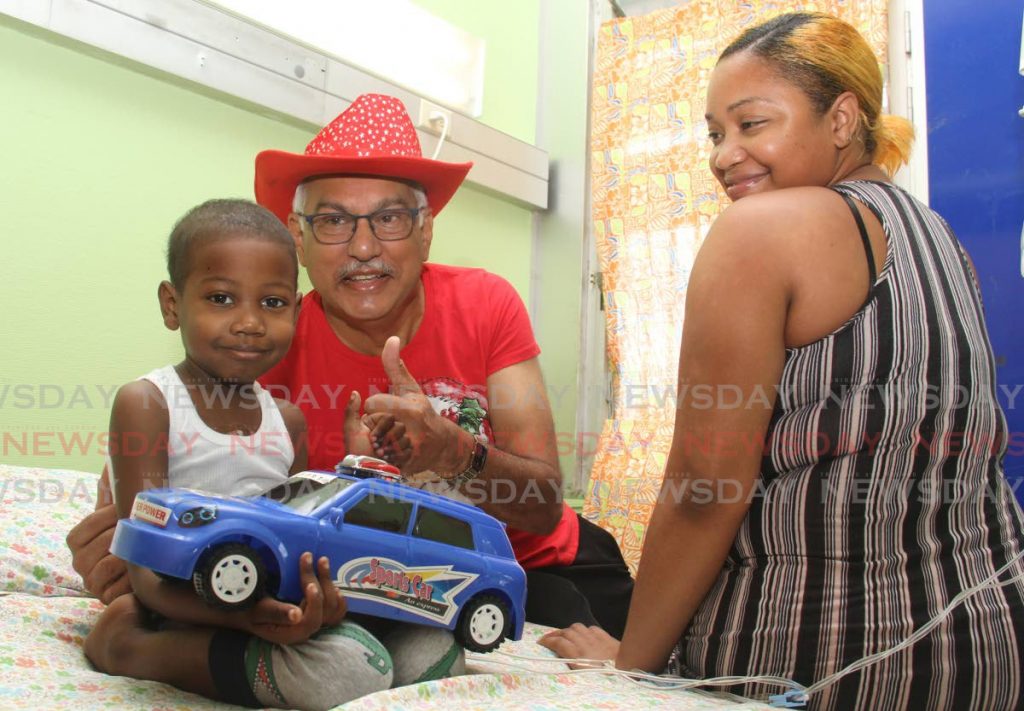Deyalsingh defends marijuana decriminalisation

Health Minister Terrence Deyalsingh, on Thursday, defended the decriminalisation of marijuana which came into effect on Monday. He was responding to negative reactions from some religious leaders.
Deyalsingh said the government recognised not everyone would be pleased with the decision, and he welcomed and respected the different views expressed.
He was speaking to members of the media after visiting several children in the Just Because Foundation Ward at the Wendy Fitzwilliam Children’s Hospital in the Eric Williams Sciences Complex, Mt Hope.
Deyalsingh said Attorney General Faris Al-Rawi and Minister in the Ministry of the Attorney General and Legal Affairs, Fitzgerald Hinds held four public consultations where people were invited to express their views before the law was proclaimed on December 23. In addition, he said Al-Rawi read numerous written proposals from those for and against decriminalisation.
“At the end of the day I think the government, led by the Prime Minister, took a very considered, careful view of how we would treat this issue, which is not only an issue of marijuana – decriminalisation of 30 grammes and under, but it’s a social justice issue.”
He said, as Dr Rowley said in his contribution in the House of Representatives, the jails were clogged up mainly by young black men who were caught with small amounts of marijuana while others who used and smoked marijuana were free to live their lives.
Deyalsingh said, despite claims by some, research indicated that marijuana was not a gateway drug. “As a matter of fact, the evidence will tell you that alcohol may be a bigger problem when it comes to being a gateway drug than marijuana. So whilst I respect the views of everybody in TT, as Minister of Health I can only go on evidence, I can only go on data and research. And the research I have done does not show that marijuana is any more of a gateway drug than alcohol or cigarettes. So we have to be very careful of how we shape the conversation.”
The minister said, after much research, consultation, reviews of the pros and cons, and careful consideration, the government took the best approach in the best interest of TT.
He said, during the consultations and the debate it was made clear that, like alcohol, marijuana should not be used by young people as it had a damaging effect on the developing brain.
Deyalsingh said parents would have the main responsibility of speaking to their children about marijuana use. But, he also instructed the National Alcohol and Drug Abuse Prevention Programme (NADAPP) to go into schools early next year to talk to students, teachers and parents about the damaging effects of all drugs including ecstasy, “zesser pills”, marijuana, amphetamines, alcohol, and tobacco.
When asked about the use of marijuana for medicinal purposes, Deyalsingh said the sector would be developed once the Cannabis Control Bill goes through the joint select committee. He said it would set out the rules for the Health Minister to issue licences for large-scale cultivation and exportation of marijuana.
He noted that cannabidiol (CBD), a natural compound found in marijuana, had medicinal properties and did not produce a high. He said a few CBD-based drugs in the US treated two severe forms of paediatric epilepsy, Lennox-Gastaut syndrome and Dravet syndrome, and were Food and Drug Administration approved.
“The current therapy, whilst effective to some degree, this Epidiolex, based on CBD, has shown to be much more effective. It’s not a cure... It needs to be used with caution like any other drug.”
Dr Joanne F Paul, head of the Paediatric Emergency department, agreed saying when CBD was added to affected children’s treatment, it was so effective that the number of seizures may be reduced from 100 to one or two a day. She believed the drug could be considered in moderation.
“That’s something for us to look progressively at. We can’t be black and white, ‘this is bad, this is good.’ It has to be used specifically and in moderation.”


Comments
"Deyalsingh defends marijuana decriminalisation"